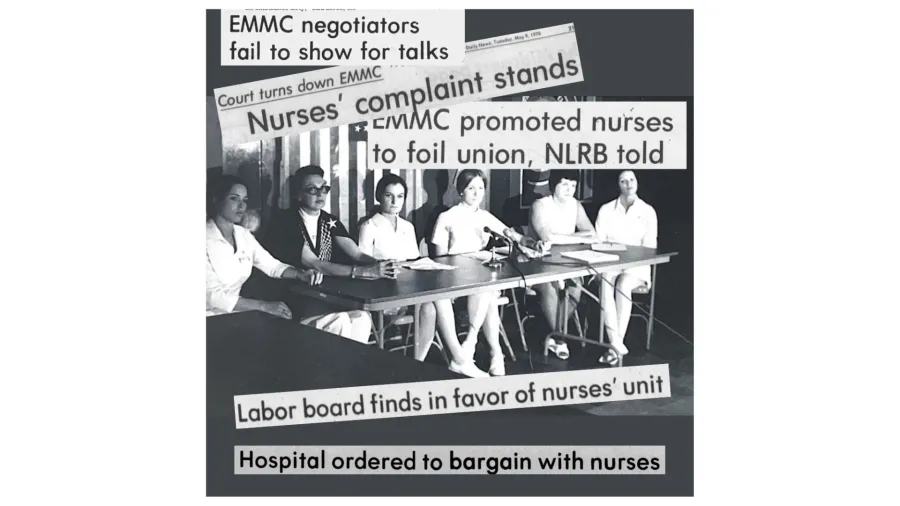Labor History: Part 3 - The First Union Contract at a Hospital in Maine

This article is the third part in a series on the history of nurse organizing in Maine. You can read part one here here and part two here.
After a First Circuit Court judge in Boston ordered Eastern Maine Medical Center to bargain in good faith with the Maine State Nurses Association after five years of delays and legal appeals, the hospital finally relented.
Throughout the winter of 1981 and ’82, both sides met for some very heated negotiations. The nurses’ bargaining committee volunteered their time without pay for months as the hospital fought their demands. They often negotiated evenings with a crockpot of chili one of the nurses brought in for dinner. One time, the nurse instructors brought the bargaining committee pizzas. Meanwhile, management and its attorneys were getting paid well to be there and were able to go out to dinner every night.
“It was really a commitment for us because people put in their time, their effort, their money,” said Barron.
But just because the hospital claimed it was bargaining in good faith, that doesn’t they were. After 26 bargaining sessions, a group of nurses, patients, clergy and other community supporters calling itself “Citizens for Quality Health Care” gathered on Monday, June 14, 1982 at the Holiday in Bangor to condemn the EMMC board for its intransigence in negotiations.
“Tonight marks our 27th session and we are no closer to a contract now then we were in January,” MSNA Executive Director Nancy Chandler told the group. Another picket was planned for June 25, the following week. Chandler said a strike was one tool the nurses had if management wouldn’t agree to a fair contract.
“These nurses do not want to strike,” Chandler said. “They are concerned about the quality of health care in this community and continuity of care at EMMC. This is a tool they do not want to use, yet day after day, they are being forced closer to withholding their services.”
Audience members pointed out that bedside nurses knew a lot more about quality health care than the businessmen on EMMC’s Board of Trustees who were failing to act in the best interest of patients, employees and citizens of Eastern Maine in negotiations.
“Businessmen and development people decide the fate of building plans and patient care,” said Anna Gilmore, President of the bargaining unit. “Nurses are merely laborers at this hospital.”
The following week, MSNA filed another unfair labor practice complaint that “nurses were harassed and threatened if they took part in the picketing.” Fortunately, the two sides came to agreement the day before the scheduled picket. On June 24, 1982, seven years after the EMMC nurses launched their organizing campaign, they voted 192-11 to ratify their first union contract at a hospital in Maine. Champagne corks flew in a conference room at the Bangor Ramada Inn after the bargaining team announced the results.
The contract included:
- Pay raises of between 30-35 percent for most nurses over two years, including an 8.5 percent wage increase in the first year and 8 percent in the second.
- Improvements to dental and life insurance
- Pay increases for nurses working nights and weekends
- Sabbatical for faculty at the nursing school after 7 years
- Replacement of holiday, sick and vacation time with a system of planned, earned and paid time off.
- An increase in the discount at the cafeteria from 20 to 30 percent
- Increases to uniform and shoe allowances
But the hospital refused to agree to a union security clause to ensure all of the nurses in the unit paid for the costs of collective bargaining. That was another battle.
“In that first contract we didn’t get everything we wanted,” said Barron, “but looking back and not knowing a lot, other than reading several other nursing contracts from other states, I was pleased with it.”
However, two years later the hospital would once again try to break the young union.
“I think it’s quite evident that they want to push our backs to the wall,” said MSNA President Sandra Putnam in September, 1984 as a strike deadline loomed.
Next week: Part 4 - Another Struggle for a Second Contract
